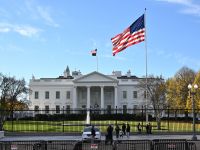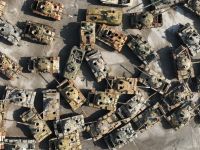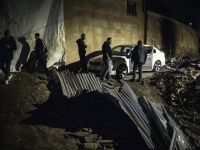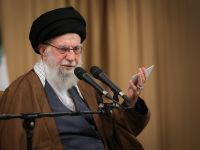Iraqi airplane shot down a U.S. unmanned surveillance drone over southern Iraq Monday, American military officials admitted.
The Predator drone was conducting a reconnaissance mission, a senior official with U.S. Central Command said, according to AP.
Iraqi fighter aircraft penetrated the southern no-fly zone over the country and fired on the Predator, and its controllers then lost contact with the plane, the official added.
"This action is the latest chapter in a lengthy list of hostile acts by the Iraqi regime," said Jim Wilkinson, a Central Command spokesman.
It should be recalled that The New York Times reported Monday that the U.S. Air Force had quietly test-fired Stinger missiles from some of the Predators. According to the plans, the missiles will allow the drone to defend itself against Iraqi fighter jets that threaten it.
Gen. Richard Myers, chairman of the Joint Chiefs of Staff, said in Washington he did not view the incident as an escalation of the dispute and that it was in keeping with previous Iraqi hostility toward U.S. and British aircraft.
"I do not see it as an escalation," he said.
An Iraqi military spokesman said the U.S. Predator, flying from a base in Kuwait, had breached Iraqi airspace while on a spy mission. "With God's help, and with the will of the men of our heroic air defense forces and brave sky eagles, it was shot down in a delicate and planned operation," the Iraqi statement said.
The international financial markets signaled a belief war is increasingly likely. Oil prices jumped to their highest levels in months with February crude on the New York Mercantile Exchange up at one point to $32 a barrel. Brent crude oil futures in London rose $1.38 to $29.72 a barrel.
Meanwhile, international nuclear experts said on Monday they had started privately interviewing people with "critical information" as part of their mission to disarm Iraq.
"We are now I think in the process of interviewing people inside Iraq in private...but we are also working on the practical arrangements to take people out of Iraq," said Mohamed ElBaradei, chief of the International Atomic Energy Agency.
"We have first however to identify those who are willing to cooperate with us, those who have critical information that will enable us to succeed," ElBaradei said. He added the IAEA needed to ensure interviewees could give information with the assurance that they would be safe after speaking to inspectors.
"We need to be concerned about their safety either providing them asylum, or if they decide to go back that their safety and their families are secure," he said. (Albawaba.com)
© 2002 Al Bawaba (www.albawaba.com)







